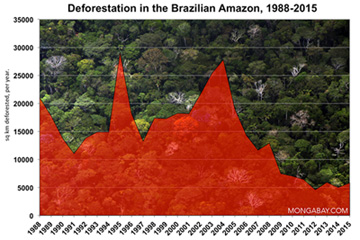U.S. and Brazil sign deforestation agreement
Brazil and the United States have signed an agreement to worth together to reduce deforestation as part of an effort to slow climate change
mongabay.com | March 07, 2010
The memorandum of understanding signed by Secretary of State Hillary Clinton in Brasilia last Wednesday comes as talks on REDD, a proposed climate change mitigation mechanism that would pay tropical countries for reducing emissions from deforestation and degradation, move forward despite the lack of a formal climate treaty.
Under the MOU, Brazil and the United States will establish a Climate Change Policy Dialogue, which will meet at least once a year to work towards developing and implementing pragmatic solutions and policies for reducing emissions, including carbon markets; coordinating "joint efforts on research, development, deployment and dissemination of technologies for combating climate change;" and capacity-building in sectors related to climate change.
The agreement is significant because the two countries have been somewhat at odds over how a scheme to reduce emissions from deforestation would work. In the early stages, Brazil balked at the prospect of allowing rich, industrialized countries off the hook via REDD without reducing their own emissions, instead proposing an aid-based approach embodied in the $21 billion Amazon Fund, which was announced in 2008.
"Brazil is not interested in giving industrialized countries cheap carbon credits from protecting the Amazon if they are not going to stop building coal-fired power plants," William Boyd, a professor of law at the University of Colorado who has worked extensively on REDD policy issues, told mongabay.com last year.
Both countries have since moderated their stance, with Brazil signaling it would be open to some offsetting provided the United States and Europe agree to substantial reductions in their own industrial emissions.
The U.S. has also been in talks with Indonesia, the world's second largest deforester and biggest source of carbon dioxide emissions from land use change, about REDD strategies and implementation.











No comments:
Post a Comment